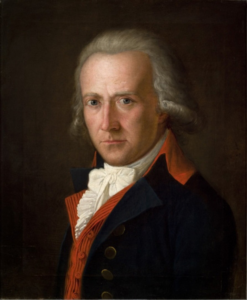Happiness of youth
(Poet's title: Jünglingswonne)
Set by Schubert:
D 983
for TTBB quartet[1815 or 1816]
So lang im deutschen Eichentale,
Natur, dein hehrer Schauer webt,
Und bei des Mondes Geisterstrahle,
Der Adler Wodans mich umschwebt;
So lang in der Erwählten Blicken
Mir tausend Himmel offen stehn,
Und mit vergötterndem Entzücken
Wir Arm in Arm durch’s Leben gehn,
So lang in wackrer Brüder Kreise
Der Bundeskelch zur Weihe klingt,
Und jeder nach der Ahnherrn Weise
In Tells und Hermanns Jubel singt,
Will ich den Gram den Winden geben,
Selbst Augenblicken Kränze weihn,
Und noch, wo Todesengel schweben,
Den Pfad mit Rosen mir bestreun.
In this German oak valley, so long
As your noble mystery envelops me, nature,
And, by the ghostly light of the moon,
Wodan’s eagle hovers around me;
In the glances of the one I have chosen, so long
As a thousand heavens open up to me,
And with a rapture that turns me into a god
We go through life arm in arm;
In the honest circle of brothers, so long
As the cup of union is clinked in devotion,
And everyone follows our ancestors and
Sings the praises of Tell and Hermann:
I shall cast my cares to the winds,
I shall devote a wreath myself to those moments,
And still, as the angel of death descends,
I shall strew my path with roses!
All translations into English that appear on this website, unless otherwise stated, are by Malcolm Wren. You are free to use them on condition that you acknowledge Malcolm Wren as the translator and schubertsong.uk as the source. Unless otherwise stated, the comments and essays that appear after the texts and translations are by Malcolm Wren and are © Copyright.
☙
Themes and images in this text:
Arms and embracing Drinking Eagles Germany and being German Night and the moon Oak trees Roses and pink Valleys Wind
Matthisson began work on this poem just after he became a student in the University of Halle at the age of seventeen. It has many of the features that we would expect of an idealistic teenager: earnestness; passion; a delight in nature, in love and in sociability; a solemn commitment to the future and willingness to face up to future mortality. It also has elements that seem surprising in someone so young: a devotion to ancestors and to the ‘nation’.
Of course, the reference to ‘German’ valleys full of oak trees (or are they valleys filled with German oak trees?) was not really about a nation state, since there was no such thing as Germany in 1778. Yet the honour shown to Tell and Hermann does seem to reflect an incipient nationalism that goes beyond the sort of cultural appreciation of what it was to be ‘deutsch’, as set out in Herder’s Von Deutscher Art und Kunst (On German Character and Art) of 1773. Hermann / Arminius had led the Germanic tribes to victory against the Roman Empire in the Battle of Teutoberg Forest (9 AD / CE), and Wilhelm Tell was the legendary (though possibly also real) leader of the Swiss Cantons in their rebellion against the Holy Roman Empire at the beginning of the 14th century. These were political figures, and Matthisson wants to associate them with the sort of ‘brotherly’ conviviality that he celebrates with his drinking companions.
☙
Original Spelling Jünglingswonne So lang' im deutschen Eichenthale, Natur! dein hehrer Schauer webt, Und, bei des Mondes Geisterstrahle, Der Adler Wodans mich umschwebt; So lang' in der Erwählten Blicken Mir tausend Himmel offen stehn, Und, mit vergötterndem Entzücken, Wir Arm in Arm durchs Leben gehn; So lang', in wackrer Brüder Kreise, Der Bundeskelch zur Weihe klingt, Und jeder, nach der Ahnherrn Weise, In Tells und Hermanns Jubel singt: Will ich den Gram den Winden geben, Selbst Augenblicken Kränze weihn, Und noch, wo Todesengel schweben, Den Pfad mit Rosen mir bestreun!
Confirmed by Peter Rastl with Gedichte von Friedrich von Matthisson. Erster Theil. Tübingen, bei Cotta, 1811, page 3; with Morgenblatt für gebildete Stände. Dritter Jahrgang. 1809. Im Verlag der J. G. Cotta’schen Buchhandlung in Tübingen. Nro. 250. Donnerstag, 19. Oktober, 1809, page 997; and with Friedrich von Matthisson, Gedichte, Zurich, Füssli, 1851, pages 11-12.
To see an early edition of the text, go to page 3 [25 von 380] here: http://digital.onb.ac.at/OnbViewer/viewer.faces?doc=ABO_%2BZ185186703


